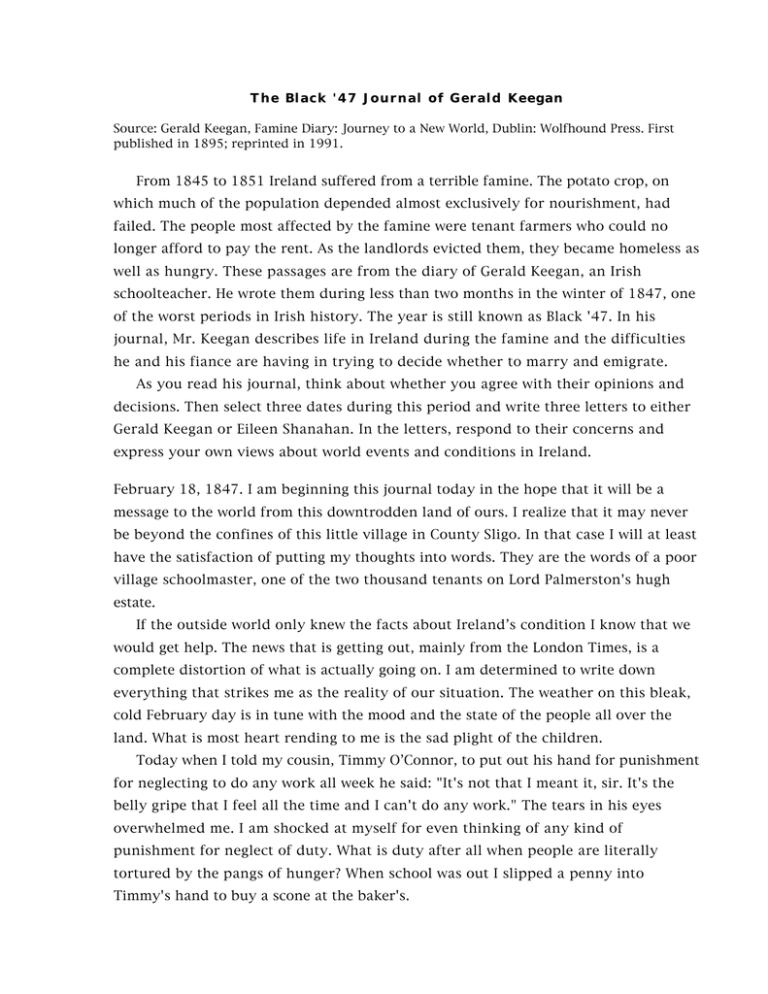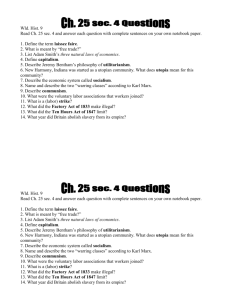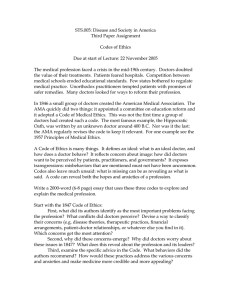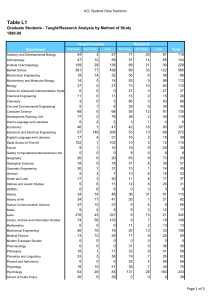The Black '47 Journal of Gerald Keegan
advertisement

The Black '47 Journal of Gerald Keegan Source: Gerald Keegan, Famine Diary: Journey to a New World, Dublin: Wolfhound Press. First published in 1895; reprinted in 1991. From 1845 to 1851 Ireland suffered from a terrible famine. The potato crop, on which much of the population depended almost exclusively for nourishment, had failed. The people most affected by the famine were tenant farmers who could no longer afford to pay the rent. As the landlords evicted them, they became homeless as well as hungry. These passages are from the diary of Gerald Keegan, an Irish schoolteacher. He wrote them during less than two months in the winter of 1847, one of the worst periods in Irish history. The year is still known as Black '47. In his journal, Mr. Keegan describes life in Ireland during the famine and the difficulties he and his fiance are having in trying to decide whether to marry and emigrate. As you read his journal, think about whether you agree with their opinions and decisions. Then select three dates during this period and write three letters to either Gerald Keegan or Eileen Shanahan. In the letters, respond to their concerns and express your own views about world events and conditions in Ireland. February 18, 1847. I am beginning this journal today in the hope that it will be a message to the world from this downtrodden land of ours. I realize that it may never be beyond the confines of this little village in County Sligo. In that case I will at least have the satisfaction of putting my thoughts into words. They are the words of a poor village schoolmaster, one of the two thousand tenants on Lord Palmerston's hugh estate. If the outside world only knew the facts about Ireland’s condition I know that we would get help. The news that is getting out, mainly from the London Times, is a complete distortion of what is actually going on. I am determined to write down everything that strikes me as the reality of our situation. The weather on this bleak, cold February day is in tune with the mood and the state of the people all over the land. What is most heart rending to me is the sad plight of the children. Today when I told my cousin, Timmy O’Connor, to put out his hand for punishment for neglecting to do any work all week he said: "It's not that I meant it, sir. It's the belly gripe that I feel all the time and I can't do any work." The tears in his eyes overwhelmed me. I am shocked at myself for even thinking of any kind of punishment for neglect of duty. What is duty after all when people are literally tortured by the pangs of hunger? When school was out I slipped a penny into Timmy's hand to buy a scone at the baker's. February 19, 1847. When I came to my boarding house after school today Mrs. Moriarty, my landlady, told me that my Uncle Jeremiah was coming over to see me. Poor man, he must be coming to ask for some help to keep Timmy and the two girls alive. But I won't have a shilling in my pocket till the board pays my quarterly salary, if indeed my allowance could be called a salary. The drawn and haggard look of Jeremiah when he came to the door left me in no doubt about his own half-starved condition. Many of the parents in this area are starving themselves in an attempt to keep their children alive. I got Mrs. Moriarty to roast another herring and serve it to him with a cup of tea. It turned out that he did not come to borrow or beg but to talk of emigration. He claimed that the whole country was in the throes of a mass emigration movement to Canada. I knew about it myself but I also know that it is, deep down, a forced expulsion under a plan conceived and now being executed by the landlords. February 21, 1847. It is true that there is a potato famine in practically every part of the country but there is corn and wheat and meat and dairy products in abundance. For putting his hands on any of this, the tenant is liable to prison, even to execution or exile. February 23, 1847. The most disheartening effect of the intense sufferings of the people is a kind of despair and a sense of hopelessness that they are beginning to show. The average Irishman is a lover of conversation, music, poetry and even of leprechauns, so symbolic of the spirit world in which we like to roam. But all of these, together with the saving gift of seeing the humorous side to even the most desperate situation, is giving way to an alarming indifference to what fate has seemingly decreed for us. March 3, 1847. I started school after Christmas with 23 pupils. This week there are 14 left. I don’t think I can endure facing their pathetic-looking glances much longer. I am trying to teach them something about the various uses of numbers, though about the only practical calculating they can do is to count the number who are dying around them every day. March 7, 1847. Father Tom noted my presence in Church and he sent an altar boy to ask me to come and see him. After a hearty greeting he led me to his humble presbytery for a cup of tea. We had a long chat about the emigration movement. We agree that it would be better to meet death right here, in preference to submitting to the treacherous terms of the landlords. We did not mention it but I’ve heard that there is a price on his head. I feel that this will be our last meeting. When told about my engagement to Eileen Shanahan he was genuinely pleased and favoured going ahead with the marriage, suggesting that it would be a small tribute to life in a world of death. March 8, 1847. Evictions and tumblings are going on at a mad rate now. The tumblings are cruel. The brutality of the herds of marauders who are smashing down the humble cottages of the tenants knows no bounds. People are beaten, even killed, when they resist. They are given no time to remove their belongings. Seldom are there any reasons given for the evictions. Living on a choice bit of land, not turning in enough crop to the landlord, being in arrears with the landlord's rent or the fees collected by the State church -- any of these can serve as excuses for the tumblers to demolish a cabin without warning. March 9, 1847. I had a long chat with Eileen today. She came to the school and saw my woe-begone little group of scholars. Acutely aware as she is, of all that is going on, she still continues to radiate happiness. On the way home she expressed her complete agreement with my plan to close the school very soon. The main topic of our conversation was the emigration movement. Should we join the emigrants or should we stay here? We both want to do something for our people and the choice is a difficult one to make. The vast majority of the tenants in this district have made the decision to risk emigration. They are our kith and kin. And once they sign a paper they will be at the mercy of the landlords and their agents. We feel that they are the ones who will be in great need for help. These considerations make us feel that we should join them. Eileen’s father, the last of her family, is going to move to Limerick where some of his relatives live. He is in ill-health and feels that his term is short. Eileen showed me a clipping form the London Times which shows how ridiculously ill-informed, or should I say deliberately blind, are the people who are mainly responsible for our condition. The clipping contained a news item which tells us that the Queen, on the basis of information given to her by ministers of the government, declared that there seems to be a "dearth of provisions in Ireland." If she had only declared that there is a "dearth of provisions for a few million who are under the heel of oppression and plenty of food for the chosen few," she would have been telling the truth. March 11, 1847. Tomorrow is Thursday, the day I intend to close my school. I am packing my few books this evening and trying to brace myself for tomorrow. Eileen knows the way I feel about it all and she is coming to visit me tomorrow evening. We will make our final decision on the emigration question. March 12, 1847. I sat at my desk in school for a long time after the children left today. It was with tears in my eyes that I told them they would have to stay home for a while, though I myself knew it was forever. The ordeal of witnessing them trying to say goodbye to me was crushing. Some of them seemed to know that it was a final goodbye. Eileen arrived early and, to get our minds off the present, we talked about our immediate future. If we are to join our people in their exodus we must get things done immediately. March 25 is our choice for a wedding date. Getting our few belongings together will be a simple matter for we own very little of this world’s goods. I was not at all surprised when Tim Maloney dropped in this evening. He keeps steady on the move and is finely tuned to what is really happening in these dark times. As usual he brought some important news. Referring to the emigrants he told us that the landlords have selected the old, the infirm, the children and the destitute for the first shiploads to Canada. Anyone who is still able to work for them, to make the land produce, they are trying to hold back. March 13, 1847. The outside is finally learning about our plight. Contributions are coming in. Newspapers in Dublin and Cork are publishing the names of countries, all over the world, that are collecting money and sending it here to help provide food for the starving. This is very uplifting. The thought that the outside world is concerned about us adds hope where all else is despair. The United States, the chosen homeland of many thousands of Irish emigrants, outdid all others in generosity. A city named Philadelphia topped all other United States centres in the magnitude of its donation. The Jewish people of New York city matched the Irish in their response to a public appeal for funds. Among all the donations from various parts of the world there is one that is singularly appreciated. It comes from a small tribe of native North American Indians, the Chocktaw tribe from central western United States. These noble-minded people, sometimes called savages by those who wantonly released death and destruction among them, raised money from their meager resources to help the starving in this country. This is indeed the most touching of all the acts of generosity that our condition has inspired among nations. March 16, 1847. The emigration scheme, though fraudulent and treacherous, is serving one useful purpose. It is raising a flicker of hope in the hearts of many who would otherwise give up. Countless thousands are now ready to take the chance. Today the local agent came with an attorney who got the people to sign a paper. What they are signing is a release of all claims on their property and furniture and a promise to give the agent possession by April 10. March 22, 1847. Patrick Michael Shanahan, Eileen’s father, died during the night. Like myself Eileen is an orphan now. On account of the pestilence Patrick will have to be buried without delay. March 24, 1847. Tomorrow, Thursday, is still a big question mark. As far as we ourselves are concerned, I mean Eileen and myself, there is nothing to prevent us from going ahead with the wedding ceremony. But convention demands a reasonable period of mourning. I purposely spoke to several of my closet friends to sound out their opinion. They all seem to think that, considering the times in which we live, there would be nothing indelicate about carrying out our plan. March 27, 1847. Thursday was our big day and it was indeed a big day for our guests. After the wedding Mass, Father Flynn invited all present to a meal at the schoolhouse at noon hour. Where it all came from I cannot for the life of me imagine but there before us was a huge pot of hot vegetable soup, scones, and even some cakes, fish and gallons of tea. March 31, 1847. It is early morning as I write this last note before departing. We now join a huge army forced to leave their native land for the convenience of the rich and the powerful. The heavy morning mist is a fitting curtain for the final scene, the climax, of all our strivings against impossible odds. Project: Use the Black'47 Journal of Gerald Keegan to write an illustrated children's book of the Irish Potato famine. Rewrite the diary entries for children and draw a pictures to illustrate each passage.





